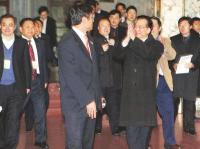
Call it a “show of democracy”, but the show just keeps on growing. Credit the mainland media for making the “two meetings” (‰∏§‰ºö) of Chinese parliament a spectacle worth following. Besides the hotly debated property law, this year’s edition is yielding a parade of celeb delegate interviews, here with Gong Li; of side debates, here over state-set gas prices; of ultra-wonky overviews, here from Xiaokang magazine, the Party center’s Hu Jintao-era spin-off of Seeking Truth; and tear-jerking moments of truth, here between a veteran rural scholar and – who else – Wen Jiabao.
To be sure, the careful scripting at the core of the sessions hasn’t changed much over the years – nothing but confirmatory vox pop on Jiaodian Fangtian tonight for Premier Wen Jiabao’s work report. But the surrounding atmospherics certainly have changed. Major magazines and metropolitan nupes like The Beijing News and Beijing Times have set a tone for tackling the annual parliament sessions more aggressively, dissecting the issues in special sections and flooding the GHOP with reporters. Chinese Internet portals have taken after the foreign news wires in rendering the NPC a live-action event, complete with color commentary.
So much for the old image of a Commie congress on cruise control. The annual expanded meeting is becoming something of a political trade fair, where cadres of all kinds have a national platform to sound out their latest ideas. State media are far from dictating the legislative agenda but can affect it, playing on existing controversies of their own hyping or reform planks that have been endorsed on-high. The buzz, optimists would argue, is a soft democratizing force of its own. For the naysayers, it’s lies on top of lies.
This year, delegates from Chongqing have made headlines with a proposal to rehabilitate hometown hero Tian Liang. The pretty-boy diver, a gold medalist at Sydney and Athens, was sent down to his provincial farm club in Shaanxi in 2005 after exploring a singing career and doing a string of ads without the consent of the state swimming federation. Tian’s then-love interest Guo Jingjing also was condemned for going too far down the capitalist road. Guo apologized and was soon reinstated – just last month she launched an Olympic celeb blog on Sina.com. Not Tian, who was accused of failing to make “proper self-criticisms”.
Now 20 Chongqing delegates want him back on the national team for 2008, led by lawyer Han Deyun. They say Tian’s return is “in the interests of the country” and argue that legal standards are needed to better protect state-invested talents like Tian from anyone who “buries, attacks, or intentionally makes things difficult for” them. The brazenly worded proposal has proven a P.R. success. Put to a poll on Sohu.com, nearly two-thirds of 12,000 respondents supported Tian as of mid-day Monday Beijing time. Some bloggers have lampooned the attempt to alter one athlete’s fate through legislation, however. A Southern Metropolis editorial contends that the unrepentant Tian is hardly the right athlete to build a case around. In stories today, Tian’s camp and swimming federation chiefs dispute whether Tian’s continued promotional activities have disrupted his training. But they seem to agree that his chances of a comeback will ultimately depend on his diving.
Leadership nuts also might want to check out Xiaokang’s article on the Hu Politburo’s routine of attending near-monthly speaker events, entitled: “Decoding the CPC Central Committee System of Group Study: First Study Law, Then Rule the Country.” The piece lists the invited scholars and discussion topics at each of 38 such symposia convened inside Zhongnanhai since Hu became party leader in late 2002. A helpful resource if anything.







